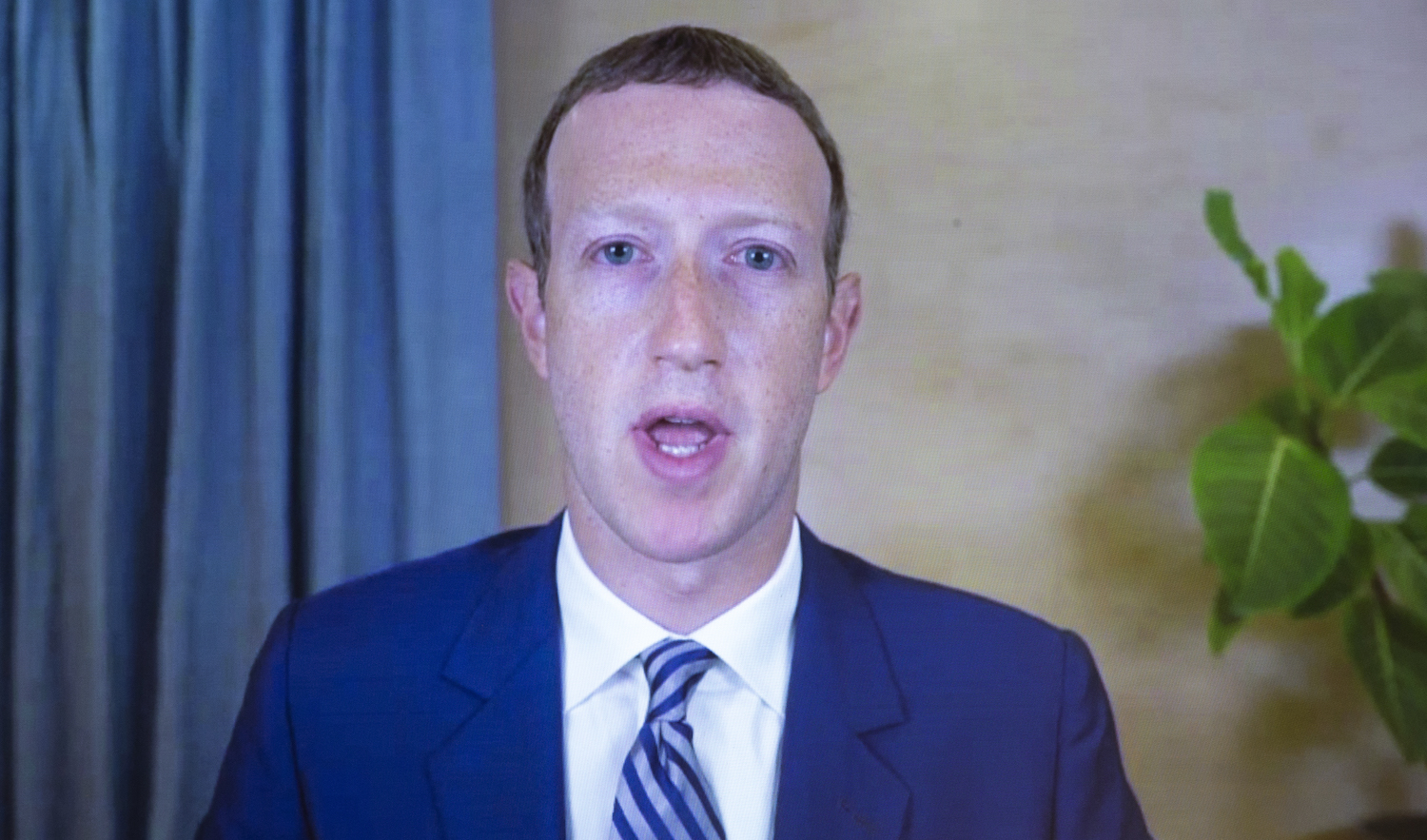Meta—a company you may remember for once calling itself Facebook, reaching a 13-digit valuation, and posting a decade-plus record of dodging regulatory scrutiny and leveraging its ability to sell ads against your data—is now in a significantly worse spot than it was one year ago, in part because regulators are scrutinizing them and competitors are making it more difficult for them to surveil you. Their only solution is whatever this is supposed to be.
Just two guys geeking out over space 🪐 pic.twitter.com/bI4Ghv9ldn
— Meta Quest (@MetaQuestVR) July 26, 2022
The last time we checked in on Mark Zuckerberg's company, they were promising a weary populace the chance to exchange life on this Earth for residency in a Chuck E. Cheese in hell, for the low cost of a $400 VR headset and the high cost of having to wear a VR headset. They became the fifth technology company to eclipse the trillion-dollar valuation mark in late June 2021, when business was booming across the sector, but by the time they cut that grim Super Bowl ad, Meta stock had already tanked because they disclosed slightly lower revenue and profits than expected. They announced similar numbers on Wednesday, though rather than report slower growth, Meta reported an actual decline. For the first time since Facebook went public in May 2012, revenue and profits were both down from the same quarter the previous year. Zuckerberg predicted that things will not improve next quarter, citing a "continuation of the weak advertising demand environment." (Hilariously, Apple introduced some new privacy features that allowed users to opt out of data collection and Meta lost $10 billion in ad revenue.)
Though they've suffered more than their competitors, it is relevant here that Meta's rough 2022 is not altogether unique, as the entire tech sector has gotten pretty squarely owned in 2022. Google and Apple announced they will both slow hiring, and even TikTok, which is still growing rapidly, laid off workers earlier this month. Companies that rely on ad revenue seem to be facing a particularly robust headwind. The difference here is that most of those other companies' stocks have bounced back over the past month or so, while Meta's has stayed down since crashing in February; it's worth 57 percent less than it was at peak value in Sept. 2021.
So, what is Zuckerberg's big plan to make up all that lost ground? It's a three-parter. Step one, per a pair of reports from the past week, is to take a more active hand in setting the work culture of Facebook. As Zuckerberg is famously aware of the concept of "other people," his labor-level solution to Facebook's woes is characteristically empathetic:
“Realistically, there are probably a bunch of people at the company who shouldn’t be here,” Zuckerberg said on the June 30th call, according to a recording obtained by The Verge. “And part of my hope by raising expectations and having more aggressive goals, and just kind of turning up the heat a little bit, is that I think some of you might just say that this place isn’t for you. And that self-selection is okay with me.”
The Verge
Step two is reconsidering one of the company's flagship products, Instagram, and boldly asking the question, "What if it sucked even bigger shit?" The app, once a service that allowed users to make their pictures of dogs look like 1850s daguerreotypes, is in something of a crisis, at least by the standards of perpetual growth and increasingly ruthless monetization efficiency by which it is judged. Instagram's whole thing is copying features from other platforms with smaller user bases and using the heft of Facebook's gargantuan user base to eventually drown out said platforms. Think swiping Instagram Stories from Snapchat, or Instagram Live from Periscope.
However, TikTok presents a problem on a different scale. The Chinese social media app is simply growing too fast and eating into Instagram's base of feral, teenage hyperconsumers to a meaningful enough degree that Instagram's initial pass at co-opting the TikTok experience (Reels) was a relative flop. TikTok has over one billion daily users, who spend more time on the app than Instagram users do, and they reached that benchmark significantly faster than any other social media platform. The most meaningful difference between the two platforms is Tiktok's emphasis on algorithmically delivered videos instead of, like, pictures of your friend's dog. So Instagram has taken the puzzling step of putting on a big TikTok costume, emphasizing videos and serving users a whole bunch of crap. After several members of the Kardashian family complained about the change, the guy who runs Instagram was like, "Since everyone responded to changes we made to our app by changing the way they use our app, we have no choice but to serve you slop."
One thing I hear a lot is people asking to see more friend content in Feed. I'd love for there to be more friend content in feed, but all the growth in photos and videos from friends has been in stories and in DMs.
— Adam Mosseri (@mosseri) July 26, 2022
Maybe Meta can make that one work, though rejiggering a service that seems to have peaked reads more like a move that will accelerate the outflow of users. But thankfully, the third phase of their plan is the big one. The reason Facebook became "Meta" was to commit to a pivot to the metaverse, which is like a version of Neopets, except you get to be the Neopet, there is less to do, everything costs money, nobody is allowed to fuck, and your experience is mediated by a VR headset. Faced with either slowed or declining user growth, Meta has staked its long-term future on the viability of a VR-mediated world where you can fall prey to NFT scams and maybe other do other stuff too. The only real use case I can see is video games, and right on time, Minecraft announced last week that they were moving away from NFTs and blockchain stuff.
Meta's virtual push is very much a Zuckerberg-driven charge. Zuckerberg has said he doesn't think the metaverse will be a profitable venture for his company until the end of the decade, which means they're going to burn through an ungodly amount of cash to get there. Meta's filings on Wednesday revealed that they spent $10 billion last quarter on metaverse projects, and they're throwing enough money around that it's disrupting Hollywood. Company leadership is not shy about the fact that the future of their business relies on the success of their metaverse pivot, a reality which seems clearer now than it did a year ago, now that Facebook is now Meta and Meta is now struggling (relatively speaking). The only way out is through, and they're determined to spend through the teeth.
They are also moving fast enough and breaking a sufficient amount of things that the federal government took the rare step of telling them to fuck off. The Federal Trade Commission announced on Wednesday that they are suing Meta in an attempt to block its acquisition of Within, a virtual reality concern. New FTC chair Lina Khan is a staunch anti-monopolist, and the lawsuit is the most important case her agency has taken on so far in her tenure. It's also an unusual one. The point of most antitrust suits is to keep huge companies from merging with each other and dominating markets through a purchased anti-competitiveness. Meta bought Within for $400 million, but the latter company is not, in any real sense, a competitor with the former. The new regulatory paradigm is suited to the pre-emptive acquisitions, debt-intensive financing strategies, and explosive growth of the tech sector, and an FTC serious about challenging Facebook on their own terms is a threat, especially for a company that is dead-set on spending its way into the future.
Whew, that was grim. I think it's time to chill out by once again watching two guys, one who founded a website dedicated to rating the attractiveness of his classmates and another who's been accused of sexual misconduct by four women, geeking out over space.
Just two guys geeking out over space 🪐 pic.twitter.com/bI4Ghv9ldn
— Meta Quest (@MetaQuestVR) July 26, 2022






